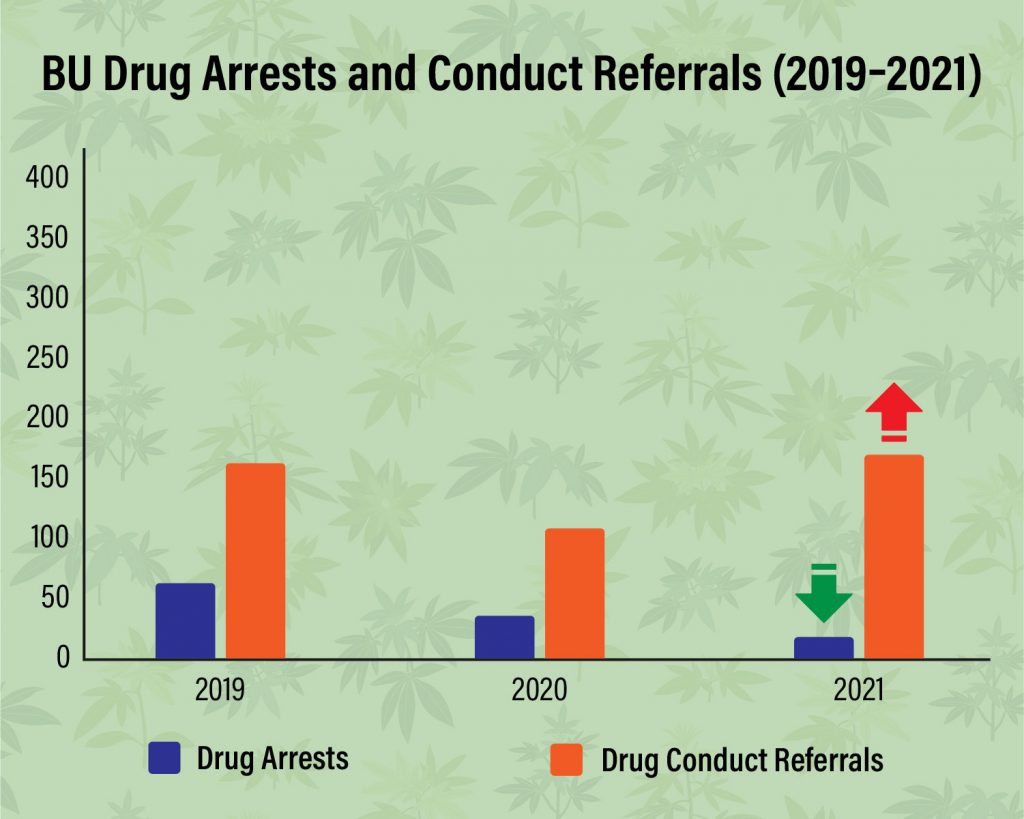2021 saw a continuing decline in drug arrests at Binghamton University.
During the 2021 calendar year, there were 12 drug arrests and 159 drug referrals made on and around University properties. This is a decrease from 53 drug arrests and 160 drug referrals in 2019, and a further decline from 116 drug arrests and 354 drug referrals in 2018.
The data is sourced from BU’s 2022 Security and Fire Safety Report, which compiles the statistics of crime and safety on campus. The report is developed according to the Jeanne Clery Disclosure of Campus Security Policy and Crime Statistics Act, or Clery Act — a federal law that requires colleges and universities to disclose information about crime on and around their campuses.
The Clery Act compiles statistics for the calendar year, January through December, rather than the academic year. The Act only counts incidents that occur on University property, so incidents that occur off-campus are not reported in the statistics.
In 2020, most students were at home due to the COVID-19 pandemic, meaning it is likely that data from that year is an outlier — 2020 saw 34 drug arrests and 102 referrals.
However, the decline from 2018, 2019 and now 2021 may be attributed to other factors, like the recent decriminalization of marijuana. Andrew Baker, BU’s Title IX coordinator and Clery Act coordinator, said it remains to be seen whether such trends will continue.
“This is just how the law is written,” Baker wrote in an email. “Whether the numbers change in the future is likely dependent upon whether the Clery Act is changed by the federal government, or whether any pertinent state laws change further in coming years.”
Trends in alcohol conduct referrals have been less clear. While the 2022 Security and Fire Safety Report only dates back to 2019, available data online shows there were 164 alcohol conduct referrals in 2017. This number grew to 379 in 2019, dropped to 224 during 2020 — the year of remote learning — and rose again to 339 in 2021.
Sasha Bilik, a freshman majoring in integrative neuroscience, explained how staying informed on these changes may assist students in becoming more aware of events occurring on and around campus.
“It will be interesting to see if this trend continues in the future,” Bilik said. “I think it’s important for students to take advantage of resources like the [Annual Security and Fire Safety Report] to stay informed about safety on campus.”
Jack Buffa, a freshman majoring in business administration, said he found the change in data to be interesting. Marijuana use remains prohibited at all SUNY institutions despite changes in state law.
“It’s surprising to see that the statistics decreased even with the announcement of New York’s first legal cannabis dispensary being downtown,” Buffa said. “It really makes you think whether the numbers will keep decreasing or not.”



